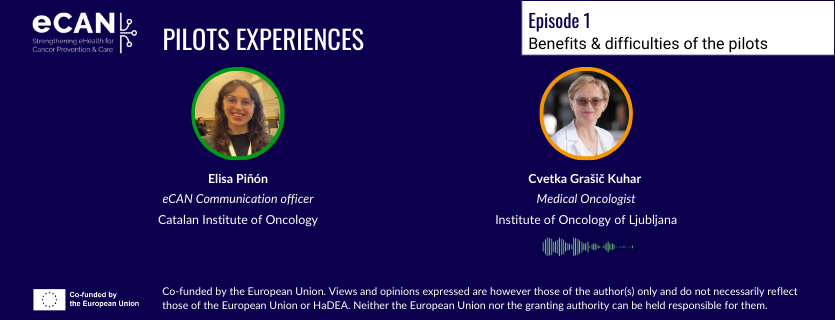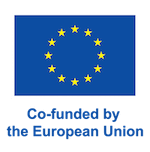Cvetka Grašič, healthcare professional involved in the pilots: “We had difficulties with the recruitment of patients, but then we found an efficient strategy for enrolment”
eCAN Bites is a podcast that gathers interviews with some of the healthcare professionals that have participated in the eCAN pilots. In four episodes we will try to dive into their experiences. How was to be involved in this study as a healthcare professional? What’s the patients’ feedback? How could this project change the current healthcare ecosystem in Europe?
In this first episode, we’ve interviewed three clinical phycologists and one medical oncologist from 4 different countries. They shed light on the main benefits and difficulties they encountered while setting and conducting the study. Some of them have participated in pilot 1a, focused on breast cancer patients. Some others were involved in pilot 1b, addressing head and neck cancer patients, and other professionals took part in pilot 2, working with advanced cancer patients.
We invite you to press play and listen to their experiences, you might be surprised by the importance of the very small details when doing a transnational study like this one.
PODCAST TRANSCRIPTION:
Elisa Piñón (00:00)
Hello and welcome to eCAN Bites. My name is Elisa Piñón, and I’m a communications officer for the eCAN Joint Action and your host for today’s episode. In this first episode, we are going to listen to the benefits and also some of the difficulties that some healthcare professionals have experienced participating in the eCAN pilots. Listen to their stories will help us to identify how we can improve our action in the future. But this is not only useful for our joint action, but also for other healthcare professionals and projects that seek to change the current healthcare ecosystem. In total, this project has involved 10 countries and 16 institutions, and today we have here the professionals from four of them. We have the pleasure to talk to Marija Turlinskiene, clinical psychologist at the Vilnus University Hospital Santaros Klinikos in Lithuania; Panagiota Karamouzi, clinical psychologist at Papageorgiou Hospital in Thessaloniki, Greece. Then we also have here Cvetka Grašič, medical oncologist from the Institute of Oncology of Ljubliana, Slovenia. And lastly, from Cyprus, Artemis Komatina, psychologist at the Cyprus Association of Cancer Patients and Friends is also joining today’s episode. So let’s get started. I would like to start with you, Marija. How was your experience participating in this project?
Marija Turlinskiene (01:32)
We have a very good experience in this project because it had extended the possibility of psychological help for patients with advanced cancer who live far away from our hospital and who found it difficult to come every week for a face-to-face consultation with psychologist. So, online counselling was available and important for patients who do not have the physical strength to come in and who do not have specialised psycho-oncological help in their place of residence. And also, I think the good experience in this eCAN project was the clear and prompt communication with coordinators, and the clear educational material and the quick resolution of problems. And there was very helpful and appreciated. This is our experience. Our patients who participated in the intervention group shared also very good experiences with the process and benefits from online psychological help. They highlighted the meaningful and good opportunity to participate in the study, because they hope that the study data will be helpful to improve and extend psychosocial care for cancer patients.
Elisa Piñón (03:26)
Thank you, Marija. Would you like to add something on the same lines, Panagiota? What’s your experience?
Panagiota Karamouzi (03:32)
It’s always nice to be part of the latest developments in your field, as in teleconsultation, and to work on this available group of patients, like cancer patients.
Elisa Piñón (03:50)
Now that we know some of the good experiences from the pilots, could you explain to us the difficulties you encountered, Cvetka?
Cvetka Grašič (03:58)
We had some difficulties in the beginning with the recruitment of patients, but then we found an efficient strategy for enrolment, and at the end, after some months, the influx of patients was according to our capacities. It was a problem that for a long time there was only an Android app and we could not include patients with iPhone. Some patients had also old (software) versions on their phones, so the app didn’t work very well. For patients, the biggest problem was the font size. Probably the programmers did not consider that cancer patients are elderly and need larger text fonts on their screen. Because of that, some patients couldn’t press the button to send the questionnaires to the platform.
Elisa Piñón (05:08)
We are seeing the importance of creating user friendly technologies and the big impact even designs and layouts may also have in telemedicine research. Thank you for your reflection, Cvetka. Let’s listen to the last input that Artemis can tell us today. What were the main difficulties you encounter, Artemis, in Cyprus?
Artemis Komatina (05:30)
I think for us in Cyprus, at least at PASYKAF, our patients have fairly easy access to care. They have access to psychological support and to various services that we offer at PASYKAF. And for patients with advanced cancer who have maybe mobility issues, we actually do home care visits. Something that we struggled with was getting patients to actually agree to try it, to take part in the study, because they actually had access to us. A lot of our patients preferred to see us in person rather than enrolling in the study because they weren’t that interested in therapy via the platform. I think that was one of our main challenges as PASYKAF, because we informed a lot of our patients. I think we had over 170 patients that we informed of the study. There was a lot of reluctance to actually take part. There were some other struggles in terms of the platform. Initially, it was, I think, with EduMeet, with the online therapy sessions. The rooms were supposed to be private, but there were some people in the rooms, especially in the initial parts of us starting the online therapy sessions. But over time, I think the problems got sorted out. I had some troubles with the application, with completing the distress thermometer, specifically. There were some struggles, which on our part, it is a little bit more time-consuming. On the one hand, seeing a patient online was helpful because we could save some time, but on the other hand, supporting the technical side, in some cases, I think it was time consuming.
Elisa Piñón (07:30)
We’ve definitely taken note of all your inputs, and we hope they are also useful for all the scientific community that want to explore telemedicine options in the EU. Thank you so much for sharing your experience with us today. We’ll leave it here, but you will have more information about our pilots and how they contribute to strengthening the eHealth ecosystem in the European Union very soon.
![]() Co-funded by the European Union. Views and opinions expressed are however those of the author(s) only and do not necessarily reflect those of the European Union or HaDEA. Neither the European Union nor the granting authority can be held responsible for them.
Co-funded by the European Union. Views and opinions expressed are however those of the author(s) only and do not necessarily reflect those of the European Union or HaDEA. Neither the European Union nor the granting authority can be held responsible for them.





